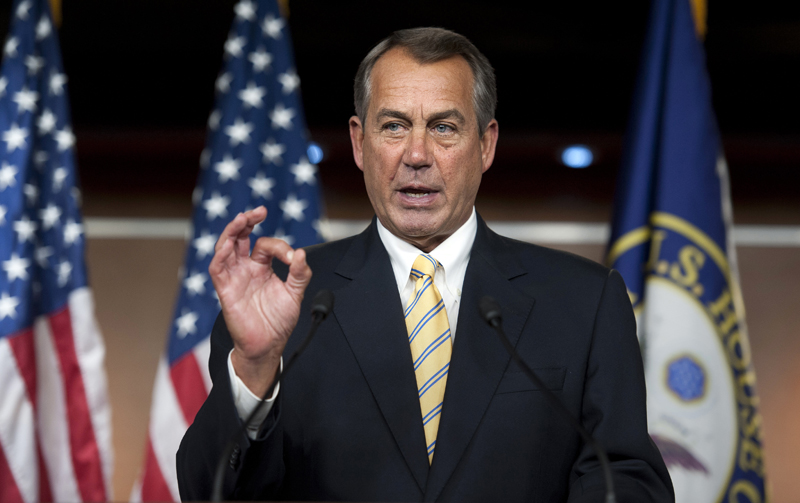Two days after President Obama’s commanding reelection victory, House Speaker John Boehner (R-OH) solemnly declared Obamacare the “law of the land” — apparently signaling that it was time to move beyond the GOP’s now-hopeless quest for repeal.
The conservative pushback was swift and brutal. Immediately, Boehner’s office was forced to clarify that he remained committed to repealing the law.
And so House Republicans will vote on Thursday — yet again — to wipe out the Affordable Care Act. By their own count, it’ll mark the 37th time they’ve voted to fully repeal or partially dismantle the President’s signature achievement.
“Albert Einstein defined insanity as, ‘doing the same thing over and over again and expecting different results.’ If that’s true, the House Republicans have truly lost their minds,” Senate Majority Leader Harry Reid (D-NV) said Wednesday, calling the Obamacare repeal vote “political kabuki” and highlight the cost of the GOP’s dead-end effort.
Conscious that the vote may be perceived as a futile partisan exercise, Boehner’s office is working the referees to aggressively prebut that characterization and frame his party’s ongoing repeal effort as responsible. A memo his office sent to reporters Tuesday noted that only two of the previous 36 votes were for full repeal and that a few of them, which rescinded funds for smaller pieces of Obamacare, were signed into law.
GOP leaders weren’t eager to hold this vote. Last month, led by Majority Leader Eric Cantor (R-VA), they tried a different strategy by bringing up a bill to transfer funds from one progressive piece of Obamacare to the law’s underfunded high-risk pool which covers preexisting conditions. But conservatives revolted, grumbling that it shores up part of Obamacare and muddles their message. Cantor and GOP leaders were forced to pull the bill at the last minute, depriving them of a talking point about helping sick people.
Behind the scenes, some conservative health wonks who supported Cantor’s bill fretted that the GOP lacks credibility on health care policy. But new Republican members complained that they had not yet had the change to vote to repeal Obamacare. The vote was announced shortly after.
“If you’re a freshman — the guys who’ve been up here the last year, we can go home and say listen, we voted 36 different times to repeal or replace Obamacare. Tell me what the new guys are supposed to say,” Rep. Mick Mulvaney (R-SC) said at the time. “We haven’t had a repeal or replace vote this year.”
The vote comes as the rate of growth of national health care spending is slowing significantly and perhaps permanently, complicating GOP predictions that Obamacare would raise costs. Not surprisingly, some supporters of Obamacare have been quick to use those figures to credit Obamacare with driving down costs.
The nonpartisan Congressional Budget Office said Wednesday that it will not score the legislation due to time constraints. In a letter to Republicans, CBO’s director pointed to its most recent Obamacare repeal score, in July 2012, which said getting rid of the law would increase budget deficits by $109 billion over the next decade.
Meanwhile, Republicans are hammering Obamacare from all sides: they’re investigating the administration‘s decision to ask health industry executives for help financing implementation of the law, and they’re using an unfolding IRS scandal to undermine it.
The repeal vote is expected to pass on a party-line vote. What happens next is less clear. It remains to be seen whether Republicans will be able to close that chapter after this and move on to more serious health care legislation, or whether they’ll remain trapped in a hopeless battle that they’ve lost in Congress, the Supreme Court and at the ballot box.






